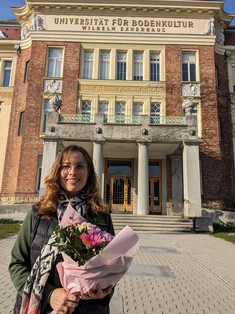We are proud to congratulate Laura Hundscheid on finishing her dissertation which focused on the sustainable protein transition in Austria. Her PhD was embedded in UniNEtZ, a collaboration project of Austrian universities and scientists aiming to foster the implementation of the SDGs in Austria.
In the abstract of her dissertation, Laura writes:
“The protein transition towards more sustainable protein production and consumption is part of a broader food systems transition and is seen as crucial to achieving the UN’s Sustainable Development Goals (SDGs). Institutions, both informal (norms, convictions) and formal (standards, policies), play a pivotal role in guiding and accelerating food systems transitions. Despite their significance, limited attention has been given to unravelling transition dynamics in the socio-technical protein regime.
This dissertation focuses on the role of institutions regarding the protein transition in Austria. The Multi-Level Perspective (MLP) is utilized as a theoretical framework, extended with institutional theory and policy mix literature. Based on a media analysis over a 20-year period, this research explores public perceptions and identifies key events shaping the protein transition. Engaging with current and recommended policies, the cross-sectoral policy mix is systematically analyzed for its comprehensiveness, consistency, and coherence. Addressing policy coherence from a methodological angle, the dissertation further explores SDGs as tools to foster coherence in sustainability transitions. A systematic literature review and expert assessment contribute to an enhanced understanding of methods in handling the complexity of the SDGs.
Results point to changes in informal institutions, such as changing convictions regarding the environmental impact of meat consumption, while formal institutions remain pending. The rigidity of the current system, in which the high status of meat is culturally embedded, was identified as a major barrier to transition. The study identifies a significant gap in the current policy mix in the absence of measures that destabilize the existing system, particularly in reducing meat consumption. Failure to address potential repercussions of regime change was identified as a major cause preventing further destabilization of the regime.”
Thank you, Laura, for your contribution to the scientific field of sustainable development in Austria and for being a wonderful team member at IDR for the past years!

